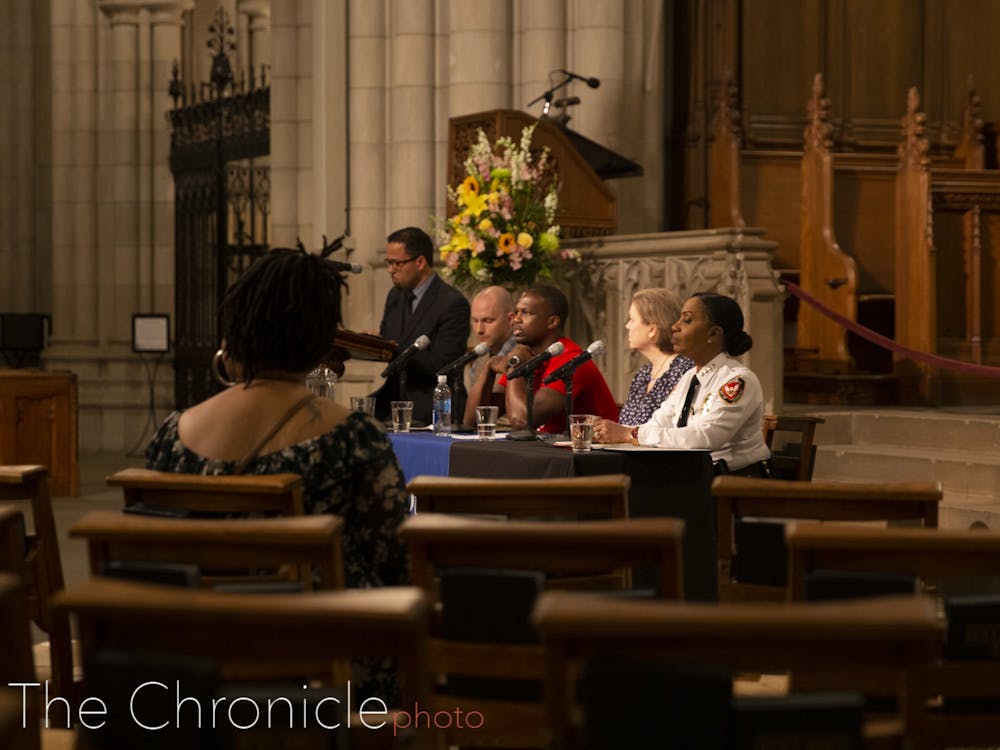Durham is no stranger to the debates emerging about gun violence around the country.
After a string of shootings in Durham, members of the community gathered in the Duke Chapel in late October for a discussion about gun violence in the city. During the panel, the four panelists touched on issues ranging from the tragic effects of gun violence on the Durham community to the ways in which race and class change the realities of gun violence of Durham residents.
“The rates of gun violence in this country are many times the rates of other advanced, industrial countries,” said Kristin Goss, Kevin D. Gorter professor of public policy and political science.
Accompanying Goss was Durham Chief of Police C.J. Davis. She mentioned that, among other factors, the “affinity for guns in this country” is one reason behind the prevalence of gun violence.
A significant portion of the panel also centered around race.
“Until there is a very intentional movement to address some of the social issues that set the foundation for crime, then I [as chief of police] will continue to be in business,” Davis said.
Ben Haas, the executive director of the Religious Coalition for a Nonviolent Durham, pointed to a conundrum in the debate.
“Some of the folks that we are most likely to police for having a gun are some of the folks who have the most logical need to have a gun,” he said.
However, some members of the audience felt that the scope of the conversation did not go far enough on the topic of race.
“Until you get why all of this is happening, if you keep going back, you’ll get back to where America is fundamentally wrong,” said Wilma Liverpool, a lifelong resident of Durham and longtime black activist.
“When you withhold 150 years of money from a community, and the community looks like me, that cuts off positive things you could do with the children,” Liverpool said. “When children don’t have art, don’t have music, don’t even have access to healthcare, what do you expect?”
Delores Eaton, another Durham resident, echoed the criticism.
“I think that it was a good effort, but that it didn’t get to the root cause,” she said. “[Even] this space, the Chapel, has a long history of denying the contributions of my people, the formerly enslaved Africans.”
Davis mentioned that 40% of guns used in crimes are stolen, oftentimes from legal owners.
“Any perception that I might have as a legal gun owner about my disconnect from the gun violence problem is illusory,” Haas added.
Jacob Charles, executive director of the Duke Center for Firearms Law, argued that gun violence problems are in fact an amalgamation of four separate problems: suicides, inner-city violence, domestic violence and mass shootings.
Few people realize that the majority of deaths and injuries attributed to gun violence are a result of suicide attempts with firearms, Charles added.
Historically, he cited that the Second Amendment has often stifled conversations about gun violence and has been “distorted by influence groups into an absolute bar on regulations.”
The core of the issue, in Charles’ view, is not the Second Amendment. It is instead the “frontiersman attitude and the associated cultural expectations” that have played a large part in the formation of America’s national consciousness as it relates to guns.
Get The Chronicle straight to your inbox
Signup for our weekly newsletter. Cancel at any time.

